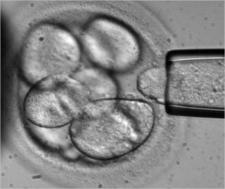Research cloning development underscores the need for US to prohibit reproductive cloning

Legislation should be put in place immediately, says public interest group
The news that researchers at Oregon Health and Science University have successfully derived human embryonic stem cells using research cloning (also called somatic cell nuclear transfer or SCNT) puts in stark relief the absence of public policy in the United States regarding human cloning for reproduction.
Today’s announcement raises concern because research cloning involves the same technique that would be the first step in reproductive cloning. For research purposes, cloned embryos are used to derive stem cells; for reproductive purposes, the cloned embryos would be transferred into a woman’s uterus.
Some 60 countries have banned human reproductive cloning. It is also prohibited by several international agreements, including the Council of Europe’s Convention on Biomedicine and Human Rights.
The United States has no such prohibition of human reproductive cloning in place. The federal government should take this opportunity to enact one.
“This news should light a fire under U.S. legislators and regulators,” said Marcy Darnovsky, PhD, Executive Director of the Center for Genetics and Society. “It’s high time for the United States to join the dozens of other countries that prohibit human reproductive cloning.”
In 2009, when President Barack Obama lifted federal funding restrictions on embryonic stem cell research, he said that human reproductive cloning "is dangerous, profoundly wrong, and has no place in our society, or any society."
Regulatory authorities should also require effective oversight of research cloning activities, in order to prevent unauthorized or misguided efforts to use cloned embryos for reproductive purposes. “If research teams begin producing cloned human embryos, we need to make very sure that strict controls are in place to prevent headline-seekers from trying to use them to produce a cloned human being,” Darnovsky said.
An additional concern about SCNT is that it requires women’s eggs, and retrieving them is an invasive procedure that carries under-studied and potentially serious risks. The latest cloning technique apparently uses fewer eggs than past SCNT experiments, but a significant number of young women could still wind up putting their own health at risk to provide eggs that would be used as research materials.
The OHSU study reports some intriguing findings about multiple egg retrieval protocols, including that certain hormonal drugs used for ovarian stimulation result in “sub-optimal quality oocytes” and that “premium quality” eggs are produced when fewer are retrieved in a stimulated cycle. These adjustments to standard protocols were made in order to obtain “optimized” eggs for research, not to protect women from adverse effects.
“It’s ironic that the focus is on the quality of the eggs, not on the well-being of the women,” Darnovsky said.
The Cell paper on the new cloning technique does not explicitly state whether some of the authors were themselves responsible for overseeing the egg retrieval procedures, which would raise concern about potential conflicts of interest. It is therefore unclear whether the study follows the recommendations of the International Society for Stem Cell Research that “wherever possible, the treating physician or infertility clinician should not also be the investigator who is proposing to perform research on the donated materials” [pdf].
# # #
The Center for Genetics and Society (CGS) is a non-profit public affairs and policy advocacy organization working to encourage responsible uses and effective societal governance of human genetic and reproductive biotechnologies.
CGS operates BioPolicyWiki, a wiki-style compendium of country-level policies and binding international agreements governing reproductive and genetic technologies and practices.
Contact:
Marcy Darnovsky
510-625-0819, ext 305
mdarnovsky[AT]geneticsandsociety[DOT]org



